We were thrilled to have our 2016 Working Group Chicago Meeting at the University of Chicago’s Neubuaer Collegium, and extend the conversation during meals at restaurants all over the South Side of Chicago.
For more photos, visit our Flickr album.
Our 2nd working group meeting of scholars met June 6-10, 2016 at the University of Chicago in the beautiful Neubauer Collegium for Culture and Society. Although the sessions were closed, you can read our scholars’ abstracts for their June Meeting Topics here and see more photos up in our Flickr album for the week.
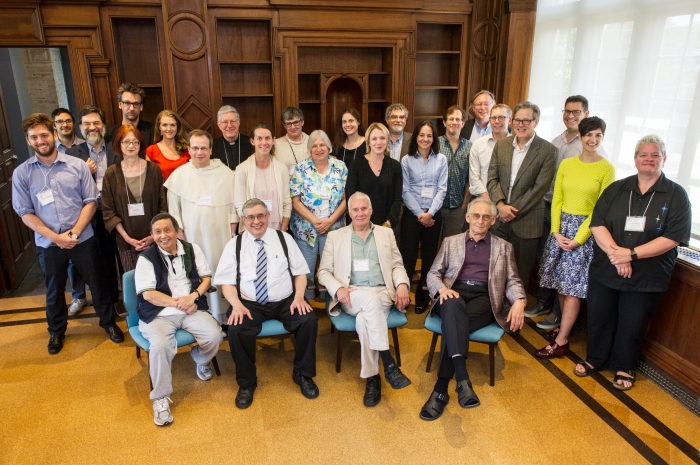
We’re so happy our scholars are here in Chicago! Find out more about our scholars and their work this week in June here, and working group meetings in general, here.
Our scholars and team are:
From left to right, back row: Santiago Mejia, Michael Gorman, Matthias Haase, Jennifer A. Frey, Father Kevin Flannery, Candace Vogler, Katherine Kinzler, Howard Nusbaum, Talbot Brewer, Reinhardt Huetter, Marc G. Berman (not pictured: Tahera Qudbuddin).
Middle row: Christian Kronsted, Jean Porter, Father Thomas Joseph White, Mari Stuart, Nancy Snow, Heather C. Lench, Angela Knobel, Erik Angner, Dan McAdams, Valerie Wallace, Jaime Hovey.
Front row: Paul Wong, David Shatz, David Carr, Anselm Mueller.
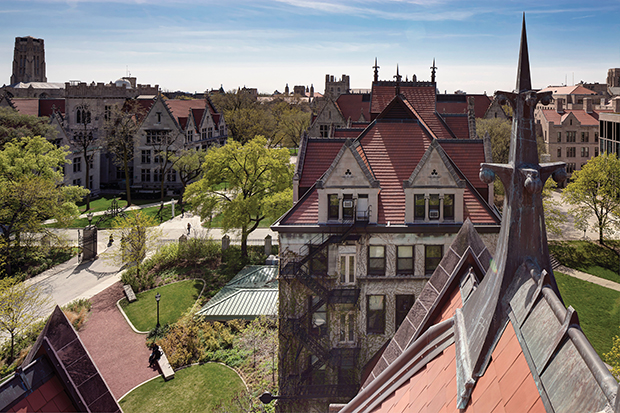
This coming week (June 6-10, 2016, at the Neubauer Collegium at the University of Chicago) is the second of four meetings for our scholars (the first was December 2015 at the University of South Carolina). These meetings are immersive experiences for these scholars, who are philosophers, theologians, and psychologists; the meetings are aimed at generating systematic and integrated knowledge, including ultimately a new construct for empirical research on self-transcendence, new instruments of assessment, and new data.
Here are summaries of the questions and research our scholars will be discussing with each other in the coming week.
Matthias Haase: Can virtue be cultivated like a habit?
Tahera Qutbudden: Can one enjoy a happy and pleasurable life in this world while also preparing for the next?
Jennifer A. Frey: Is selfishness a particular kind of vice, or the nature of vice?
David Schatz: Is ignorance always a vice, or can it also be a virtue?
Heather C. Lench: Can boredom lead us to virtue?
David Carr: Does spirituality have a material dimension, and if so, can it be developed and educated?
Mari Stuart: Can the indigenous knowledge reflected in a moral ecology worldview teach things that climate science cannot?
Jean Porter: Can malice, like virtue, also give meaning to life?
Erik Angner: Is social well-being the same thing as happiness?
Paul Wong: Is it possible to measure Self-Transcendence?
Katharine Kinzler: Can infant food preferences teach us about the social world?
Mark Berman: Do ugly surroundings encourage criminal behavior?
Angela Knobel: Can the notion of virtue as a gift from God have broad appeal?
Father Thomas Joseph White: Can Aquinas help us understand Nietzsche’s ideas about truth and moral freedom?
Michael Gorman: Is a meaningful life also necessarily a good life?
Nancy Snow: Is magnificence—expenditure for the public good—virtuous, or vicious? Can it be both?
Tal Brewer: Are human beings irreplaceable, and due special forms of regard and good treatment?
Dan McAdams: What is the difference between habit and character? Do we narrate these things about ourselves in different ways?
Reinhard Hütter: How do we overcome the lure of self-sovereignty that surrounds us and attain true self-transcendence?
Father Kevin Flannery: What is the relationship between intention, choice, and virtue?
Nancy Snow, Dan P. McAdams; Reinhard Huetter, Paul Wong, Fr. Thomas Joseph White; David Shatz, Michael Gorman; Matthias Haase, Talbot Brewer; Candace Vogler; Reinhard Huetter, Mari Jyväsjärvi Stuart, Marc G. Berman; Marc G. Berman, Heather C. Lench; Reinhard Huetter, Talbot Brewer; Fr. Thomas Joseph White, Paul Wong; Mari Jyväsjärvi Stuart, Heather C. Lench; Reinhad Huetter, Nancy Snow; Michael Gorman, Jennifer A. Frey; Candace Vogler, Michael Gorman; Jennifer A. Frey, Jaime Hovey, Matthias Haase; Kristján Kristjánsson; Erik Angner; Dan P. McAdams; Jennifer A. Frey; Mari Jyväsjärvi Stuart, Jean Porter; Mari Jyväsjärvi Stuart; Marc G. Berman, Dan P. McAdams; Fr. Kevin Flannery, Matthias Haase; Erik Angner, Jennifer A. Frey; Kristján Kristjánsson, Paul Wong; Jennifer A. Frey, Matthias Haase)
For more photos, visit our “December 2015 Working Group Meeting” Flickr album.
Welcome to our first working group meeting (December 14-19, 2016).
On Wednesday Father Thomas Joseph discussed the relationship between grace and nature, and Paul Wong talked about measuring happiness. In the afternoon Marc Berman discussed his research on nature restoration theory, or how nature commands attention from the mind in a way that restores cognitive energy and creativity. Michael Gorman discussed a purposeful life, and how sometimes we need to stop and listen rather than throw ourselves into “doing something.”
On Thursday Nancy Snow and her collaborator Jennifer Cole Wright discussed their work on measuring ordinary virtues. In the afternoon, Eric Angner spoke on the science of “happiness,” and Reinhard Hütter talked about doing without religion and the virtue of religion.
Friday morning Dan McAdams presented his work on stories of generativity, or the commitment to future generations. Jennifer Frey talked about happiness as a constitutive principle of action in the work of Aquinas. On Friday afternoon Mari Stuart spoke on Hindu moral ecology in an era of climate change, and the meeting week ended with Matthias Haase discussing G. E. M. Anscombe’s “stopping modals” and the necessity for justice.
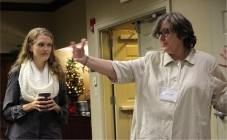
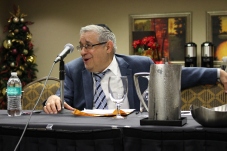


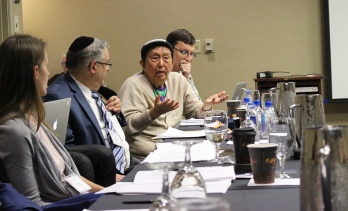
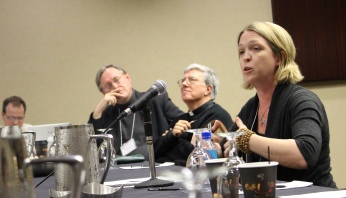
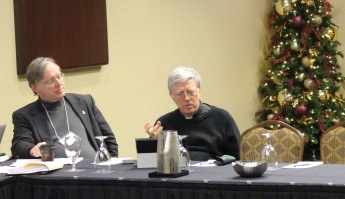

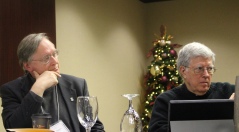
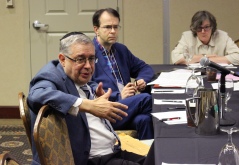




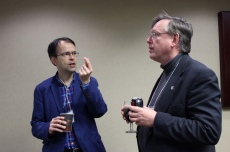

(Jennifer A. Frey, Candace Vogler; David Shatz; Candace Vogler, Heather Lench, Marc G. Berman, Mari Jyväsjärvi Stuart, Mattias Haase, Paul Wong, Jean Porter; Jennifer A. Frey, Michael Gorman, Nancy Snow, Fr. Thomas Joseph White; Mari Jyväsjärvi Stuart, David Shatz, Paul Wong, Nathan Cornwell; Fr. Thomas Joseph White, Reinhard Huetter, Fr. Kevin Flannery, Heather C. Lench; Reinhard Huetter, Fr. Kevin Flannery; Candace Vogler, Jean Porter, Kristján Kristjánsson, Mari Jyväsjärvi Stuart; David Shatz, Kristján Kristjánsson, Candace Vogler; Talbot Brewer, Kristján Kristjánsson; John Haldane; Fr. Kevin Flannery; Talbot Brewer, Matthias Haase; Kristján Kristjánsson, Reinhard Huetter; Talbot Brewer)
For more photos, visit our “December 2015 Working Group Meeting” Flickr album.
Welcome to our first working group meeting (December 14-19, 2016).
Some of us started arriving in Columbia, South Carolina as early as Saturday. The weather was nearly 70 degrees when we left the airport that evening and drove into town. Columbia was teeming with graduating students and their families, everyone dressed in their best clothes to celebrate, and the air was golden. It did not feel like the middle of December, which everyone agreed was a good thing.
On Sunday evening we had a cocktail reception at the Hilton Columbia Center for arriving scholars, where we met and mingled for a couple of hours. On Monday things began in earnest, with breakfast at 8 a.m. followed by the first of our working group sessions. Our first morning session featured David Schatz talking about humility, and Kristján Kristjánsson talking about awe. Schatz argued that knowing your weaknesses was the crux of humility, while Kristjánsson suggested that awe makes us at once greater and more humble beings.
There was no afternoon session that day, so everyone was free to rest, take a walk, or explore downtown Columbia. That evening John Haldane delivered a lecture at the Law School on Virtue, Happiness, and Meaning. Haldane used images from the Columbia Museum of Art to discuss how we can recoil from a seeming absence of meaning in the world, or we can probe further for meaning. More than 100 people attended the talk and enjoyed the reception afterward.
The next day, Tuesday, Jean Porter presented on Thomas Aquinas and Justice, arguing among other things that what orients us towards justice is hope and charity. Heather Lench discussed her work on how seemingly disruptive emotions can be very productive for helping people achieve their goals. After lunch Tal Brewer talked about dialectical activity as spontaneous rather than fixed in its intention, and Father Kevin Flannery explored issues of complicity, guilt, and evil.
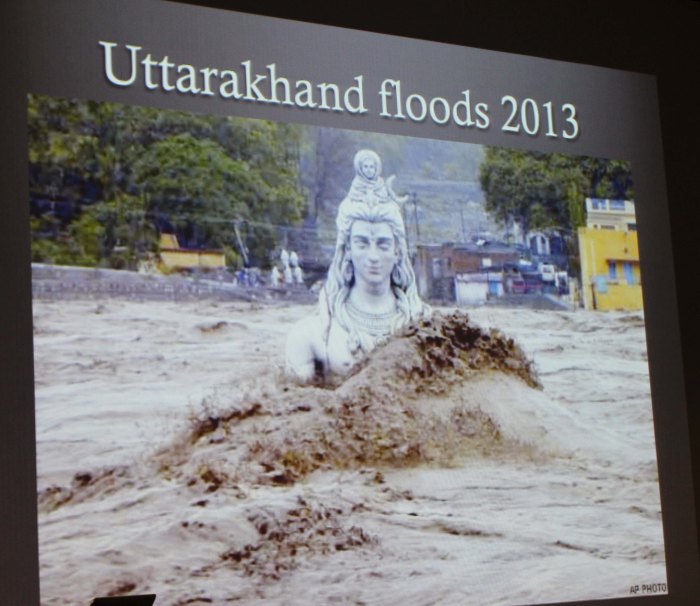
What cultural and religious frameworks do Indian Hindus draw on when making sense of chaotic and unusual weather patterns brought on by global climate change? While South Asia’s rural inhabitants perceive radical changes in weather patterns that affect their daily lives and livelihood, their perceptions about the underlying reasons vary. Few frame the developments in terms of climate change as a global phenomenon; instead, chaotic climate events are often attributed to either divine retribution or human moral corruption.
These diverse, even conflicting ways of articulating the role of the human and the divine in destructive climatic patterns invite the questions: How do religious agents in Hindu India understand human moral responsibility, particularly the role of human morality and goodness, in shaping both long-term and short-term climactic and environmental patterns? What kinds of perceptions about the impact of morality on ecology and climate do we find in traditional Hindu sources, and how do contemporary Hindus draw on similar conceptions in making sense of contemporary global climate change? Perhaps most important are the potential implications of these questions: if human individual moral laxity plays a role in aggravating detrimental climate change, could it then be that, conversely, human moral excellence and virtue might have the power to mitigate such climate change?
While scholars of religion have studied the interface between religion and ecology since the early 1970s, the specific question of religious responses to global climate change has until now received little attention. This is at least partially because climate change has emerged as a subject of global, widespread discussion only in the last decade. Climate scientists are now nearly unanimous in warning about the potentially catastrophic consequences of unchecked global warming. A changing global climate has already begun to affect human societies, making them increasingly vulnerable to disasters, crop failures, and forced migration.
In confronting the questions of safety, sustenance, livelihood, consumption, and environmental justice resulting from this situation, communities worldwide also inevitably end up having to engage questions of moral, spiritual, and religious tenor as well. Some have even suggested that the world’s religious traditions have unique potential to motivate concern and activism to address the problem of climate change. After all, religion remains a powerful force and motivator in the lives of most people in the world, influencing believers’ worldviews, values, and relationship to the natural world. Because of this strong resonance, religious leaders are able to engage large audiences and mobilize them unlike few other actors. Religious narratives also provide people with a sense of meaning, and present a natural context for ethical deliberation (Veldman, Szasz, Haluza-DeLay 2013; Sponsel 2005).
The situation is particularly urgent in India, home to over a billion people, where the effects of climate change are affecting the most vulnerable part of the population: India’s rural poor. Similarly, the moral and spiritual resonance of environmental issues is particularly rich there, as Indian Hindu religious stories, myths, and practices have always been interwoven with natural phenomena and the very shapes of the landscape.
My research project centers on investigating what I, following Ann Gold (2002) and Frédérique Apffel-Marglin (2000), call the “moral ecology” of contemporary Hindu India – namely, the ways in which religious agents perceive a connection between the human moral condition and the condition of the environment. Unlike Gold and Marglin, however, I consider this question specifically in relation to the phenomenon of climate change. The primary questions driving this research are: What cultural and religious frameworks do Indian Hindus draw on when making sense of chaotic and unusual weather patterns brought on by global climate change? To what degree do they view environmental degradation as being due to human choices and actions—as opposed to, say, divine agency or fate? What moral and spiritual resources does the Hindu tradition offer in the face of the unprecedented challenges posed by a warmer and less predictable world?
My research for this project has involved carrying out interviews (in Hindi and in English) with farmers, educators, and environmental activists in the three states of Uttarakhand, Rajasthan, and Andhra Pradesh. My preliminary findings suggest that while India’s rural inhabitants perceive radical changes in weather patterns that affect their daily lives and livelihood, their perceptions about the underlying reasons vary. Few frame the developments in terms of climate change or rising CO2 levels; instead, they tend to attribute chaotic climate events to either divine retribution or human moral corruption. However, a great deal more work is needed for me to fully explore these complex questions.
Mari Jyväsjärvi Stuart is Assistant Professor, Religious Studies, University of South Carolina and a scholar with Virtue, Happiness, & the Meaning of Life.
Kami adalah bintang utama di dunia togel online, diakui secara internasional dan di seluruh Asia! Dengan kualitas yang luar biasa, komitmen kuat, dan profesionalisme yang tak tergoyahkan, Bandar Togel telah menjaga reputasi ini selama bertahun-tahun di dunia judi toto togel. Mari bergabung dan rasakan semangat serta kualitas terbaik bersama kami!
Situs togel online resmi yang menawarkan pasaran Hongkong menjadi salah satu pilihan Toto Togel aman dan terpercaya bagi pemain. Dengan metode deposit yang fleksibel seperti Dana, pemain dapat dengan mudah menyetorkan modal mereka tanpa kesulitan. Pasaran HK menawarkan hasil yang adil dan cepat, menjadikannya salah satu pasaran yang paling diminati oleh para pemain togel.
Kemudahan transaksi menjadi salah satu alasan pemain memilih situs togel tertentu. Dengan pilihan deposit menggunakan Dana dan Gopay, beberapa Togel Terbesar menawarkan proses yang cepat dan aman untuk pemain, sekaligus menyediakan pasaran lengkap dengan peluang besar.
Patch kecil kemarin ternyata memperbaiki glitch penting yang sering dimanfaatkan pemain, penjelasan lengkapnya bisa kamu lihat melalui toto. Mode latihan cocok buat uji mekanik baru. Gunakan sebelum masuk ranked biar lebih siap.
Menang di Bo Togel bukan hanya tentang keberuntungan; ada strategi yang dapat meningkatkan peluang Anda secara signifikan. Dari memilih nomor yang tepat hingga memahami pasaran yang paling menguntungkan, artikel ini akan membahas strategi terbaik untuk meraih Bo Togel Hadiah Terbesar. Dengan sedikit perencanaan dan analisis, Anda dapat meningkatkan kesempatan untuk meraih kemenangan besar di Bo Togel.
Banyak pemain togel yang mengandalkan hasil Keluaran Macau untuk merumuskan angka taruhan mereka. Hasil ini biasanya diumumkan secara resmi dan mencakup berbagai pasaran. Dengan mengecek keluaran Macau, pemain dapat menentukan angka terbaik untuk taruhan berikutnya.
Tidak hanya sekadar angka, tetapi Keluaran Macau juga menjadi alat analisis bagi bettor yang serius dalam bermain togel. Banyak pemain yang mencatat angka-angka yang keluar setiap hari untuk mencari tren tertentu yang bisa digunakan sebagai referensi taruhan berikutnya. Semakin cepat mereka mendapatkan informasi mengenai hasil keluaran, semakin baik pula mereka bisa mempersiapkan strategi taruhan.
Patch terbaru bikin beberapa konten lama relevan lagi dan layak dimainkan ulang menurut toto. Tips bermain konsisten lebih efektif daripada maraton sesekali. Progres jadi stabil.
Skin eksklusif rank tinggi ini bikin tampilan makin beda dan syaratnya ada di toto togel. Update anti-cheat bikin permainan lebih adil. Pemain jujur jadi lebih nyaman.
Salah satu keuntungan bermain Toto Togel adalah adanya berbagai jenis taruhan yang bisa dipilih. Mulai dari taruhan 2D yang lebih mudah dimenangkan hingga taruhan 4D yang menawarkan hadiah terbesar. Dengan memilih jenis taruhan yang sesuai dengan strategi dan modal, pemain bisa meningkatkan peluang menang mereka.
Tidak ada momen yang lebih ditunggu selain saat keluaran macau diumumkan, sebab pengumuman itu menjadi penentu keberhasilan strategi sekaligus tantangan untuk putaran berikutnya.
Pengembang Link Slot Gacor seperti NetEnt dan Play'n GO terus berinovasi dengan menghadirkan permainan slot yang kaya grafis, efek suara yang memukau, serta animasi yang memikat.
Salah satu rahasia sukses dalam bermain slot adalah mengelola modal dengan baik. Tentukan batas taruhan dan sesuaikan dengan peluang di setiap putaran. Dengan strategi pengelolaan modal yang tepat, Anda dapat bermain lebih lama dan meningkatkan peluang menang tanpa perlu mengorbankan terlalu banyak dana. Selain itu, manfaatkan juga scatter hitam yang tersedia di dalam permainan slot mahjong ways 2 terbaru hari ini.
Saat ini, banyak situs judi online yang menyediakan Slot Depo 5k dengan peluang kemenangan yang besar. Dengan modal yang sangat kecil, pemain masih memiliki kesempatan untuk menang besar. Slot ini sangat cocok bagi mereka yang ingin bermain hemat namun tetap merasakan sensasi kemenangan besar.
RTP slot tertinggi menjadi daya tarik utama dalam dunia perjudian slot online, karena memberikan peluang menang yang lebih tinggi dibandingkan game dengan RTP rendah. Dengan memanfaatkan rtp live, pemain bisa mengetahui apakah sebuah slot gacor hari ini atau tidak. Slot rtp tertinggi hari ini sering kali menawarkan kesempatan menang yang lebih besar, sehingga sangat penting untuk selalu memperbarui informasi tentang rtp slot tertinggi hari ini. Ini membantu para pemain untuk mengambil keputusan yang tepat dalam memilih permainan.
Banyak pemain mencari situs slot yang menawarkan pengalaman bermain terbaik, dan Slot Toto berhasil memenuhi ekspektasi tersebut dengan fitur unggulan yang tidak dimiliki oleh platform lain. Salah satu kelebihan utama yang membuat situs ini begitu diminati adalah variasi game yang sangat luas, mulai dari slot klasik hingga slot modern dengan tema menarik.
Keunggulan lain dari Slot777 adalah keberagaman tema dan jenis permainan slot yang ditawarkan. Dengan berbagai tema menarik seperti petualangan, fantasi, dan mitologi, pemain bisa memilih permainan yang paling sesuai dengan selera mereka. Setiap permainan di Slot 777 menawarkan pengalaman bermain yang berbeda, membuat pemain tidak cepat merasa bosan.
Para pemain kini tak perlu khawatir soal modal, karena dengan hadirnya Slot Depo 10k, mereka dapat langsung bermain berbagai jenis slot populer dan ikut bersaing mendapatkan kemenangan besar tanpa harus mengeluarkan banyak uang.
Strategi cerdas sering kali dimulai dengan modal terbatas, dan ketika seseorang mencoba berbagai jenis permainan, slot bet kecil menjadi pilihan aman untuk memahami pola mesin tanpa kehilangan terlalu banyak uang.
Untuk suasana bermain yang berbeda, slot Thailand menghadirkan tema lokal yang unik, ditambah animasi dan soundtrack khas yang membuat setiap permainan lebih hidup dan menyenangkan bagi penggemar slot.
Turnamen PvP antar guild ini bakal jadi ajang adu gengsi, info pendaftaran lengkap tersedia pada togel. Komunitas game online bikin suasana main jadi lebih hidup. Banyak tempat buat ngobrol dan berbagi pengalaman.
Update ini bikin build tertentu jadi meta baru seperti yang ramai di toto slot. Update sistem anti-cheat bikin permainan lebih adil. Pemain jujur jadi lebih nyaman.
Patch note terbaru ada perubahan cooldown yang penting, detailnya ada pada Togel Online. Komunitas game sering ngadain giveaway kecil. Lumayan kalau kamu hoki.
Event spesial kasih kesempatan dapet item yang biasanya mahal, cara farm-nya bisa kamu cek di toto slot. Jangan lupa belajar counter hero atau karakter tertentu. Ini penting banget buat ranked.
Turnamen PvP bakal pakai format baru yang lebih seru, formatnya bisa kamu cek di togel. Komunitas yang aktif biasanya punya jadwal mabar rutin. Ikut aja biar makin sering latihan.
Aktivitas yang menguji keberuntungan dan strategi memang selalu menarik, dan ketika orang mencari permainan seru, mereka akhirnya mempertimbangkan Toto, karena memberikan pengalaman bermain yang menantang sekaligus menghibur.